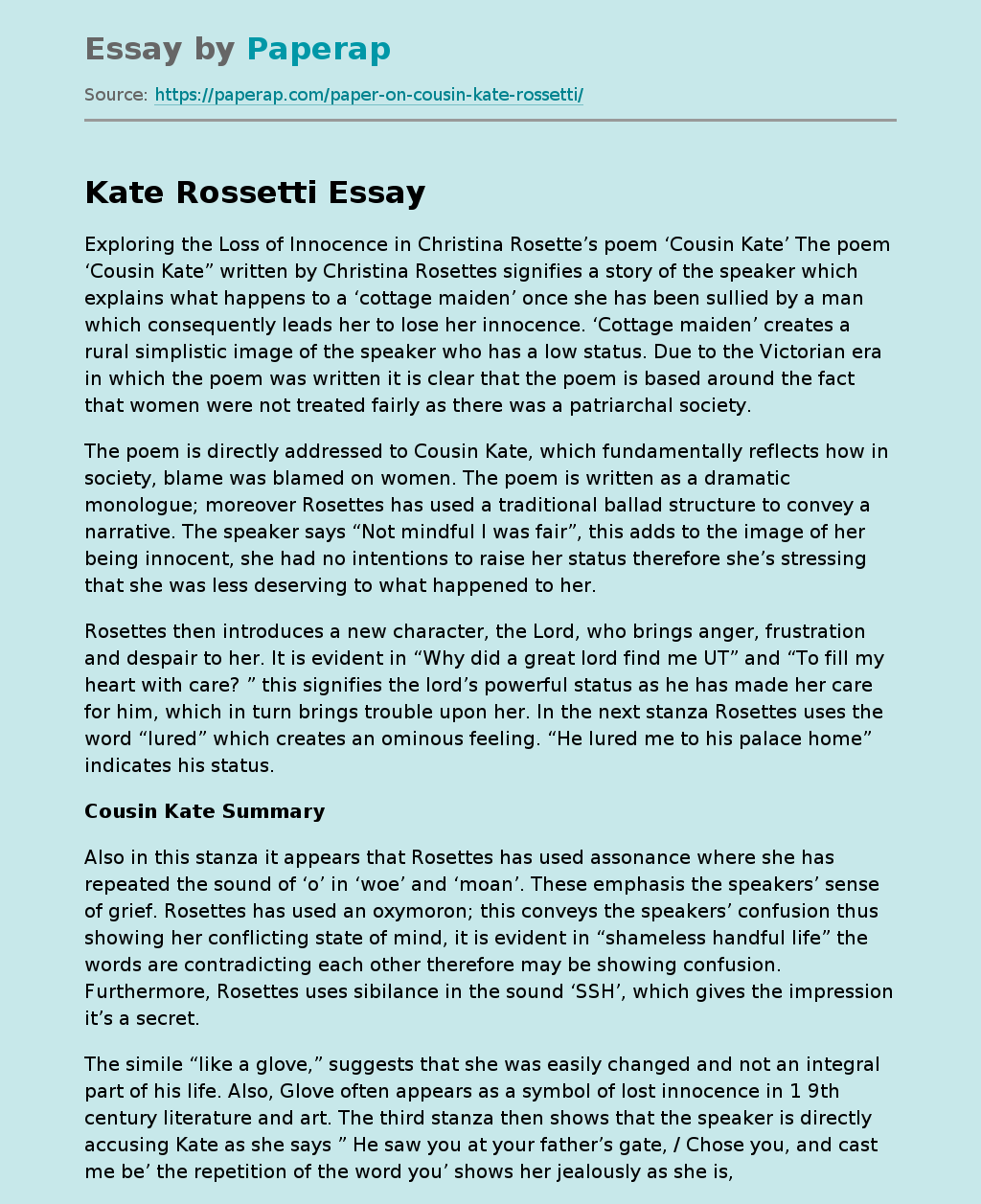Exploration of the Loss of Innocence by Christina Rosette Cousin Kate
The poem ‘Cousin Kate” written by Christina Rosettes signifies a story of the speaker which explains what happens to a ‘cottage maiden’ once she has been sullied by a man which consequently leads her to lose her innocence. ‘Cottage maiden’ creates a rural simplistic image of the speaker who has a low status. Due to the Victorian era in which the poem was written it is clear that the poem is based around the fact that women were not treated fairly as there was a patriarchal society.
The poem is directly addressed to Cousin Kate, which fundamentally reflects how in society, blame was blamed on women. The poem is written as a dramatic monologue; moreover Rosettes has used a traditional ballad structure to convey a narrative. The speaker says “Not mindful I was fair”, this adds to the image of her being innocent, she had no intentions to raise her status therefore she’s stressing that she was less deserving to what happened to her.
Rosettes then introduces a new character, the Lord, who brings anger, frustration and despair to her. It is evident in “Why did a great lord find me UT” and “To fill my heart with care? ” this signifies the lord’s powerful status as he has made her care for him, which in turn brings trouble upon her. In the next stanza Rosettes uses the word “lured” which creates an ominous feeling. “He lured me to his palace home” indicates his status.
Also in this stanza it appears that Rosettes has used assonance where she has repeated the sound of ‘o’ in ‘woe’ and ‘moan’.
These emphasis the speakers’ sense of grief. Rosettes has used an oxymoron; this conveys the speakers’ confusion thus showing her conflicting state of mind, it is evident in “shameless handful life” the words are contradicting each other therefore may be showing confusion. Furthermore, Rosettes uses sibilance in the sound ‘SSH’, which gives the impression it’s a secret.
The simile “like a glove,” suggests that she was easily changed and not an integral part of his life. Also, Glove often appears as a symbol of lost innocence in 1 9th century literature and art. The third stanza then shows that the speaker is directly accusing Kate as she says ” He saw you at your father’s gate, / Chose you, and cast me be’ the repetition of the word you’ shows her jealously as she is, in essence saying its al about ‘you’ Kate.
The third stanza explores her feelings of abandonment and jealousy whereas in stanza four the speaker is questioning Skate’s qualities. In Stanza four the speaker says the lord “bound you with his ring” this verb choice implies he has captured her or contained her in some way. Rosettes then repeats “so good and pure” which connotes her bitterness. Once again her bitterness is evident in “l sit and howl in dust’ whereas it is in contrast with “you sit in gold and sing’ which implies Kate is now wealthy but is a possession captured by the lord.
Stanza five the reader can see that the speaker believes that Kate does not deserve the lord as the speaker relates Skate’s love as “writ in sand” which implies it will get washed away. In turn this shows the speaker’s bitterness. The next few lines in stanza five show that the speaker is putting herself in Skate’s shoes however in “Hd not have won me with his love” and “l would have spit into his face” In essence she says she would have not done the same to Kate.
She’s showing violence in her language although she’s being content which may be due to her having something that Kate can never have. In the last stanza the speaker appears to be providing some sort of ammunition against Kate by saying Kate is not perfect. The last stanza begins with “Yet I’ve a gift you have not got” this suggests she has one thing she can hold onto that is better than Kate; also it is a traditional metaphor of a child being a gift.
The reader can infer the tension in the poem, underlined when Rosettes uses the antithesis of “my shame, my pride”. Her son is her pride because she loves him, but he is her shame because he is a visual reminder of her relationship with the Lord. By the end of the poem the reader can suggest that the speaker has a fear of her son being taken away as that is all she has left to herself, evident in “cling closer, closer yet” the alliteration emphasizes the love she has for her son and the fear that he could be taken away.
Lastly, the poem ends with “To wear his coronet”. This metaphor implies that if the Lord were to die, his son would inherit everything of his father therefore the speaker is saying Kate would have no share in anything of the Lord’s. The poem underlines how the speaker’s innocence has been sullied; on the other hand the Lord just moves on, this shows the inequalities between the two genders.
Exploration of the Loss of Innocence by Christina Rosette Cousin Kate. (2019, Dec 05). Retrieved from https://paperap.com/paper-on-cousin-kate-rossetti/

